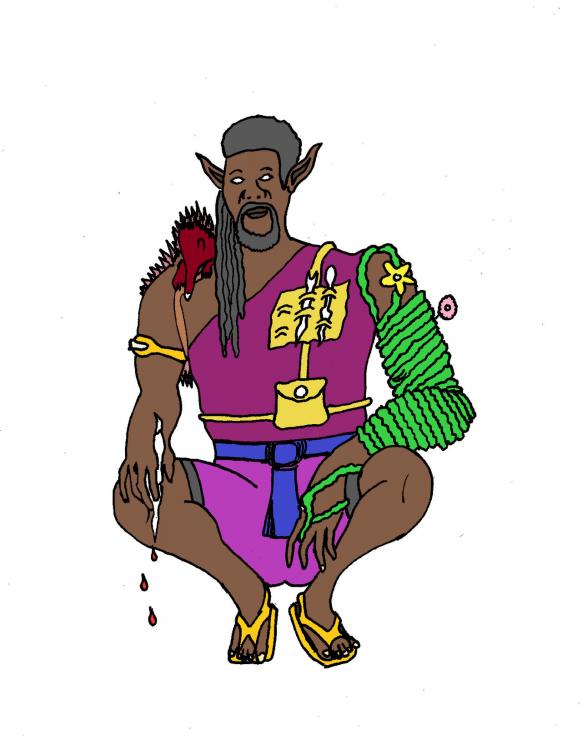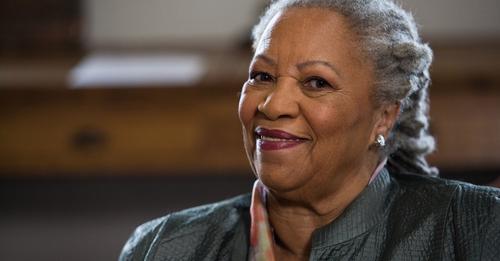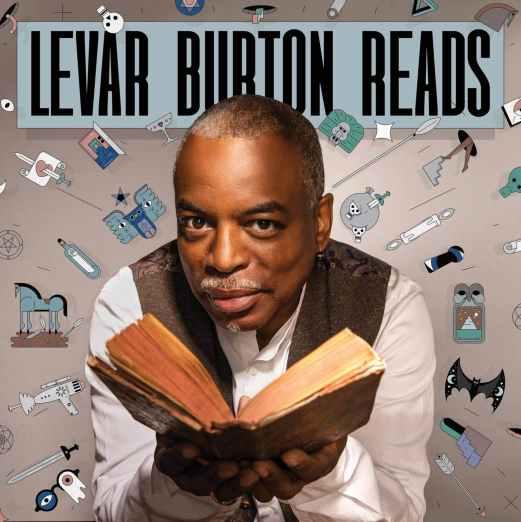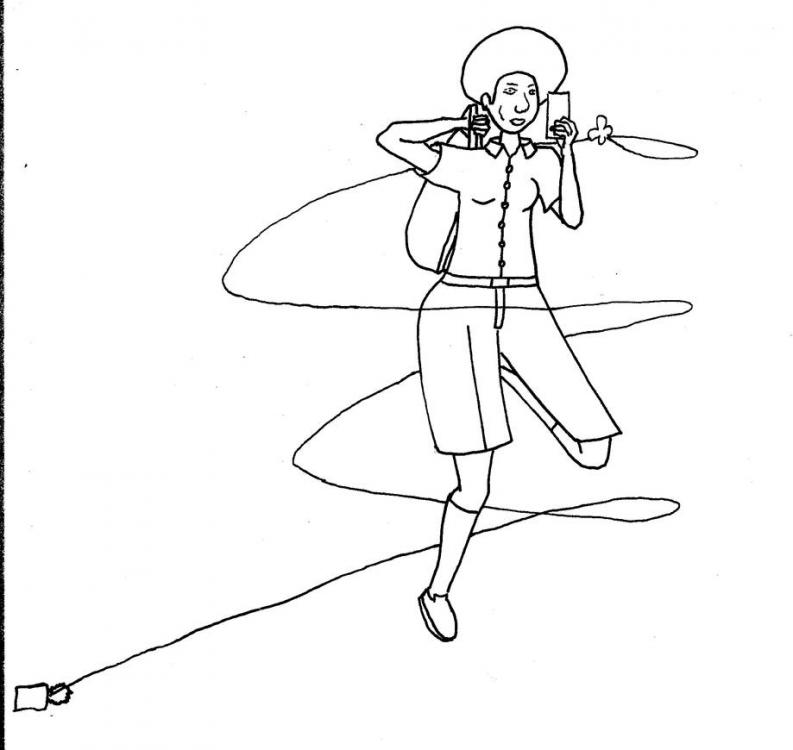-
Posts
2,415 -
Joined
-
Last visited
-
Days Won
91
Content Type
Profiles
Forums
Blogs
Events
Status Updates posted by richardmurray
-

The Story Artist Lab
Sponsored by Netflix and produced by Triggerfish, The Story Artist Lab builds on the success of their Mama K’s Team 4 all-female writers lab, which saw nine African women placed in the writing room for the first animated Netflix series from Africa.The next African Story Artists
The purpose of the Story Artist Lab is to find talent and upskill the next generation of Story Artists for the African animation industry. The Lab positions will be awarded to young citizens of an African country who show outstanding potential in the creative arts and visual storytelling.“Story artists translate screenplays into animatics, the loose first version of the movie that then shapes every step of animation that follows,” says Tendayi Nyeke, Triggerfish’s Zimbabwean-born development executive. “So having skilled story artists from the continent in control of how their stories are told is a gamechanger, not only in grooming the next African directors but also in giving pre-production artists the opportunity to establish their own voice as they bring African stories to life.” Triggerfish is calling for entries for a pan-African Story Artist Lab.
Triggerfish is always looking for great visual storytellers and this opportunity will put the selected participants on their radar for many more opportunities on great African projects.
So who can apply for the Lab?
Anyone with a love of storytelling, film, and visual language.
The Lab is targeted at experienced and inexperienced storyboard artists. There will be multiple tracks within the Lab for different experience levels.
Applicants must be citizens of a country on the continent of Africa and women are specifically encouraged to apply.
Knowledge of Photoshop (or similiar) is a requirement
Applicants may upload a storyboarding portfolio (if you have one), but all applicants must do the Storyboarding Test. Details about this test below.
Matriculated school leavers and older may apply.
The nitty gritty
The Story Artist Lab is a paid skills development programme.
The Story Artist Lab is made up of 2x 6 week Phases. Selected artists will do Phase 1 after which there is a reduced number of artists that move to Phase 2.
PHASE 1 runs from 2 August - 10 September 2021
PHASE 2 runs from 13 September - 23 October 2021
Selected artists will be required to be available for daily and weekly sessions and training.
Remote working is encouraged.
But I have no Storyboarding Experience?!
Don’t worry, here’s your chance. Some artists will have natural talent. We will be looking out for you and the idea behind this Lab is to give you an opportunity! If you have no storyboarding experience currently, check out these videos below and then go ahead and do the Storyboarding Test.Citizens of an African country can apply from Wednesday 23 June until Friday, 23 July 2021 (end of day).
All applicants are required to apply by clicking on the link below and completing the application form as required.
All applicants will need to upload the prescribed storyboarding test.
< https://www.triggerfish.com/careers/index.php?do=signin&applyjob=Story_Artist_Lab_Applicant >The Storyboarding Test
A storyboard is essentially a hand-drawn version of the movie, and helps the artists working on the film with diagrams of the action and the dialogue. The storyboard is the blueprint for the film.Watch this clip about choosing Storyboarding as a career with Story Artist Kwabena Sarfo:
Animation as a Career: WATCH: Career Options - Storyboard Artist
This module from Pixar in a Box about the Art of Storytelling is really informative.
The art of storytelling | Pixar in a Box | Computing
Ready to Test?!
Step 1: Read the Brief
All applicants need to read the following brief< https://www.triggerfish.com/careers/uploads/storytest.pdf >
Step 2: Set aside a day with no distractions!
When you are ready to engage with the brief, set yourself the challenge of boarding this sequence in 1 day. Don’t go over this if you can. We want to see what raw talent you have and what you can get through in 1 day. Have fun!Step 3: Do the Test
Whether with pen/pencil or in Photoshop (or any other storyboarding software) we will accept ONE pdf file upload.Read through the scene and start by breaking it down to the story beats and start storyboarding from there.
Once these story beat panels are in place fill in the extra panels.
Compile your storyboard panels in the right sequence please before uploading. Imagine you are not in the room and the reviewer needs to understand the sequence you are pitching.
Upload only ONE file with your application. Individual .jpgs won’t be accepted please.
Step 4: Apply online and upload your file!
< https://www.triggerfish.com/careers/index.php?do=signin&applyjob=Story_Artist_Lab_Applicant >
WEBPAGE URL
< https://www.triggerfish.com/careers/index.php?do=storyartistlab >
-

FIYAH is partnering with the LeVar Burton Reads podcast for their first-ever writing contest! Do you write speculative fiction (sci-fi, fantasy, horror)? Do you love the podcast? Have you dreamed of getting your work in front of THE LeVar Burton ever since the days of Reading Rainbow? Well, here’s your shot. We are looking for one special story to be featured in Season 10 of the podcast. For more, here’s the man himself:For a couple of seasons now, we’ve been trying to figure out how to conduct a short story contest with all of the submissions coming from listeners of the podcast. I’m happy to report that we have finally cracked the code! It is my extreme and joyous pleasure to announce the inaugural LeVar Burton Reads short story writing contest. #bydhttmwfi
-LeVar BurtonTheme: Origins & Encounters
We are interested in stories that examine the magical joys and tragic pitfalls of blended civilizations and cultural exchanges in all their forms. As our worlds change, what precious things do we carry with us and allow to be altered or demand they remain untouched? What is taken from us and what will we do to get it back? What do we allow ourselves to remember of our histories, our roots, and what do we allow ourselves to forget? What do we leave behind and what do we choose to carry into the future?Some things to consider as you think about the guidelines. How is it that blended civilizations and cultural exchanges might impact the following categories:
gods
faiths, religious traditions
food traditions
language
gender recognition
concepts of community
concepts of identity
race prejudice (human vs. other species)
We welcome works of the Indigenous fantastic, the other-worldly, and alternative histories. Works must include speculative or fantastical elements.The Submissions portal goes live on this page August 1st, 2021 – August 31st, 2021.
Prizes
First Place
The First Place Winner shall receive $500 (five hundred dollars) and First Place Winner’s Submission shall be read by LeVar Burton on an upcoming episode of the LeVar Burton Reads podcastSecond Place
The Second Place Winner shall receive $250 (two hundred and fifty dollars).Third Place
The Third Place Winner shall receive $100 (one hundred dollars).Editors for this contest include Diana M. Pho and L. D. Lewis, with the final selection being made by LeVar himself!
Diana M. Pho is an academic, playwright, and a Hugo, Locus, and Ignyte Award-nominated fiction editor. She has over a decade of experience in publishing, including Tor Books, Tor.com Publishing, and the Science Fiction Book Club. Diana currently works as Story Producer at Realm developing cutting-edge science fiction, fantasy and horror podcasts.
L.D. Lewis is an award-winning SF/F writer and editor, and publisher at Fireside Fiction as of July 2021. She serves as a founding creator, Art Director, and Project Manager for the World Fantasy Award-winning and Hugo Award-nominated FIYAH Literary Magazine. She also serves as the founding Director of FIYAHCON, chair of the 2021 Nebula Conference, Awards Manager for the Lambda Literary Foundation. She is the author of A Ruin of Shadows (Dancing Star Press, 2018) and her published short fiction and poetry includes appearances in FIYAH, PodCastle, Strange Horizons, Anathema: Spec from the Margins, Lightspeed, and Fireside Magazine, among others. She lives in Georgia on perpetual deadline, with her coffee habit, two cats, and an impressive Funko Pop! collection. Tweet her @ellethevillain.
The winner will be announced on October 15, 2021
View full submission guidelines and contest rules here < READ WHERE IT SAYS OFFICIAL RULES BELOW OR CLICK THIS LINK https://www.levarburtonpodcast.com/contestrules >
About the Podcast
< http://levarburtonpodcast.com/ >
The Stitcher Original podcast LeVar Burton Reads launched in 2017, and recently released over 100 episodes. The podcast is currently in its 9th season.
The podcast features a diverse array of short fiction read aloud by host LeVar Burton with immersive sound design and music. Story selections have included works by Toni Morrison, Neil Gaiman, Ray Bradbury, Nnedi Okorafor, Ursula K. Le Guin and Octavia Butler. LeVar Burton Reads has been featured in the New Yorker and The Washington Post and on NPR, among many other outlets.
About LeVar Burton
LEVAR BURTON is an actor, director, educator & cofounder of the award-winning Skybrary App; former host and executive producer of PBS’s “Reading Rainbow;” and a lifelong children’s literacy advocate. He hosts his own podcast, ‘LeVar Burton Reads,’ sharing the best short fiction and handpicked by the best voice in podcasting. BURTON also has a new YouTube Series ‘This Is My Story’ which highlights racism in America. BURTON starred as Kunta Kinte in the acclaimed mini-series ROOTS. BURTON also starred as Lt. Commander Geordi LaForge in STAR TREK: THE NEXT GENERATION television series and in feature films.BURTON has been nominated for three Primetime Emmy Awards along with 27 Daytime Emmy nominations, culminating in 21 wins. During its 26-year run from 1983 to 2009, READING RAINBOW was not only one of the longest running children’s television shows in history but won more than 25 awards, including 10 for outstanding series and the prestigious George Foster Peabody Award. BURTON has also been nominated twice for the Spoken Word Grammy Award and won in 1999, for narrating “The Autobiography of Martin Luther King Jr.”
FIYAH ARTICLE
< https://www.fiyahlitmag.com/levar-burton-reads-origins-encounters-writing-contest/ >OFFICIAL RULES
Official Rules
No Purchase Necessary to Enter or Win.A purchase will not increase your chances of winning.
Void where prohibited. U.S. Law Governs.
Open only to legal residents of the United States, DC, and Puerto Rico, who are at least 17 years of age at time of Entry.
SPONSORS: The LeVar Burton Reads Writing Contest (“Contest”) is sponsored by Stitcher, Inc., FIYAH Literary Magazine.
CONTEST SUBMISSION PERIOD: Entries for the Contest will be accepted between August 1, 2021 at 12:01 AM Eastern Time (“ET”) and August 31, 2021 at 11:59 PM ET (the “Contest Submission Period”). ALL ENTRIES MUST BE SUBMITTED DURING THE CONTEST SUBMISSION PERIOD.
ELIGIBILITY: The Contest is open to legal residents of the U.S., the District of Columbia, and Puerto Rico who are over the age of seventeen (17) on or before the start of the Contest and who satisfy all other eligibility criteria set forth herein (“Entrants”). Employees, shareholders, officers, directors, agents, and representatives of Sponsors and LeVar Burton Reads, the legal, promotion and advertising agencies of any aforementioned entities, and their immediate family members and those living in their household, and each person or entity connected with the production or administration of the Contest, and each parent company, affiliate, subsidiary, agent and representative of any aforementioned entity are not eligible. The Contest is subject to all applicable federal, state and local laws.
HOW TO ENTER: (1) Write a speculative fiction story between 2,800 and 5,200 words (as counted by your word processing software) (“Submission”) and (2) log on to https://www.fiyahlitmag.com/levar-burton-reads-origins-encounters-writing-contest/ and complete the entry form that will request your full name, phone number, and email address, to upload your Submission. Your Submission must be original and can be as creative as you like within the Submission Guidelines set forth below. No hand deliveries or mailed submissions will be accepted. All entries received by the end of the Contest Submission Period that are complete and otherwise qualified will be eligible to win (“Entry”). Sponsors will not acknowledge receipt of Submissions.
You may only submit one Submission.
SUBMISSION GUIDELINES: Your Submission must be an original work of authorship created by you, the person who submits the entry, between 2,800 and 5,200 words (as counted by your word processing software). Your Submission must be in English (if the original story is not in English, an English translation may be submitted). Your Submission must fit within the broad category of speculative fiction, defined as fiction that encompasses works in which the setting is other than the real world, involving supernatural, futuristic, or other imagined elements, including but not limited to science fiction, fantasy, horror, and alternate history. Submissions must not contain imagery or themes of sexual assault, graphic violence, gore or body horror. Your Submission must be respectful in its language and execution regarding race, culture, gender, sexual orientation, disability, and/or mental illness. If, in the sole discretion of Sponsors, your Submission constitutes copyright infringement, otherwise violates the rights of any third party, and/or violates the requirements set forth herein, the Submission will be disqualified. Entries that are incomplete or corrupted are void and will not be accepted.
Entrants may not copy or otherwise copy or plagiarize their Submission, in whole or part, from any source, nor may the Submission include third-party copyrighted material. Entrant must hold all rights to the entire Submission. Sponsors are not responsible for legal protection or clearance of Submissions in any form. In the event the Submission contains references to specific living people, Entrant must secure – and Winners (defined below) will be required to submit – a written release from any living person mentioned in the Submission to use their names, stories and likeness under the terms and conditions of these Official Rules. Entrant agrees to defend, indemnify and hold Sponsors harmless from and against any and all claims from any third party for any use by Sponsors of Entrant’s Submission.
JUDGING: Judging will be completed in two (2) rounds. Entries may be prescreened to ensure the Entries have satisfied and not violated the Submission Guidelines and meet with Sponsors’ general standards and practices prior to any judging.
Round 1: Beginning on or about September 1, 2021, Entries will be reviewed and scored by Sponsors’ panel of qualified judges composed of FIYAH Literary Magazine employees, and slush readers appointed by FIYAH Literary Magazine, according to the following 100-point scale:
Clarity and originality of expression (20 points).
Significance and originality of thought (20 points).
Characters: presentation and development (20 points).
Structure (20 points).
Creativity (20 points).
In the event of a tie, the entry with the highest score in creativity shall win, further ties shall be broken using the scores for Structure, Characters, Significance, and Clarity, in that order. The top three (3) scoring Submissions will be deemed the “Winning Submissions,” and their authors will be deemed the “Winners.”
Round 2: Beginning on or about October 1, 2021, Diana M. Pho, L.D. Lewis, and LeVar Burton will judge the Winning Submissions using the 100-point scale set forth above to determine first, second, and third place winners. The Winning Submission scored highest by Mr. Burton shall be deemed the “First Place Winner,” second highest the “Second Place Winner,” and third highest the “Third Place Winner.” As in Round One, in the event of a tie, the entry with the highest score in creativity shall win, further ties shall be broken using the scores for Structure, Characters, Significance, and Clarity, in that order. If all categories are tied, the Round 1 score shall determine the winner.
Winners will be notified by phone or email and will be required to respond (as directed) to the phone and/or email notification within Seventy-Two (72) hours of attempted notification. The failure to respond timely to the notification may result in forfeiture of the Prize; and, in such case, Sponsors may choose the next highest scoring entry from among the remaining eligible entries. Except where prohibited, acceptance of Prize constitutes a Winner’s consent to allow Sponsor and its promotional agents to use Winner’s name, likeness, photo, video footage, and/or biographical data for advertising and promotional purposes, without additional compensation, in perpetuity, in all media, now known or hereafter developed, in connection with Sponsor, this sweepstakes, and the Sponsor’s web sites. Winners will be required to sign and return to Sponsor an Affidavit of Eligibility, Publicity & Liability Release (“Affidavit”) and/or IRS Form W-9 (if required by IRS regulations) (collectively, “Prize Documents”), prior to and as a condition of acceptance of prize, WITHIN ONE (1) BUSINESS DAY OF RECEIPT OF NOTIFICATION or prize will be forfeited and an alternate winner selected.
The Winning Submissions and Winners’ full names may be announced and posted on the Internet, on air and in other media, in Sponsors’ sole discretion, without any compensation to Winners.
Prizes will be awarded within 45 days after Sponsor’s receipt and verification of completed Prize Documents. If a prize notification is undeliverable, or if a potential winner does not respond to the prize notification within the time specified, or if the potential winner cannot be contacted for any reason, or if the Prize Documents are not complete and received by Sponsor within the time required, or in the event of non-compliance with these Official Rules, the prize will be forfeited, and an alternate winner will be selected at Sponsor’s discretion.
Being declared a prize winner does not afford any additional benefits from Sponsor. Sponsor’s only obligation to prize winner is to award the prize elements described in the prize paragraph in these Official Rules.
PRIZES
First Place Prize: The First Place Winner shall receive $500 (five hundred dollars) and First Place Winner’s read by LeVar Burton on an upcoming episode of the LeVar Burton Reads podcast.
Second Place Prize: The Second Place Winner shall receive $250 (two hundred and fifty dollars).
Third Place Prize: The Third Place Winner shall receive $100 (one hundred dollars).
For all prizes, all federal, state and local taxes and other expenses in connection with the prize not expressly described herein as being awarded are the sole responsibility of the Winners. Winners are solely responsible for any other unspecified expenses related to their respective prizes. Winners cannot assign their prize to another person. No substitution of a prize is permitted, however Sponsors reserve the right to substitute a prize with another prize of equal or greater value. While it is Sponsors’ intention to award and perform the aforementioned prizes, they reserve the right, in their sole discretion, to publish or not publish, the Winning Submissions, and have Mr. Burton read the First Place Winner’s Submission.
CONDITIONS. This Contest is subject to these Official Rules. By participating, Entrants agree: (i) to be bound by these complete Official Rules and the decisions of Sponsors which shall be final and binding; and (ii) to waive any right to claim ambiguity in the Contest or these Official Rules, except where prohibited by law. By accepting a prize, Winners agree to release Sponsors and LeVar Burton Reads, including their parent, subsidiary and affiliated entities together with the respective directors, employees, officers, licensees, licensors and agents, and respective advertising and promotion entities and any person or entity associated with the production, judging, or administration of the Contest, (collectively, the “Releasees”) from any and all liability, loss or damage arising from or in connection with awarding, receipt and/or use or misuse of prize or participation in any prize-related activities. Sponsors reserve the right to cancel or suspend the Contest, in its sole discretion, should they receive fewer than 10 Entries, or receive no Submissions that have a judged score above 70 points, or due to circumstances beyond its control, including natural disasters. Submissions will not be returned and may be destroyed.
Incomplete, garbled, or otherwise illegible Submissions are void and will not be accepted. Sponsors are not responsible for lost, late, misdirected or corrupted Submissions, nor for any problems, bugs or malfunctions Entrants may encounter when submitting their Submissions.
Sponsors reserve the right, in their sole discretion, to cancel, modify or suspend the Sweepstakes should a virus, bug, computer problem, unauthorized intervention or other causes beyond Sponsors’ control, corrupt the administration, security or proper play of the Sweepstakes. Sponsors may prohibit an Entrant from participating in the Sweepstakes or winning prize if, in their sole discretion, they determine such Entrant is attempting to undermine the legitimate operation of the Sweepstakes in any way by cheating, hacking, deception, or any other unfair playing practices of intending to annoy, abuse, threaten or harass any other players or Sponsors’ representatives. CAUTION: ANY ATTEMPT TO DELIBERATELY DAMAGE OR UNDERMINE THE LEGITIMATE OPERATION OF THE SWEEPSTAKES MAY BE IN VIOLATION OF CRIMINAL AND CIVIL LAWS AND WILL RESULT IN DISQUALIFICATION FROM PARTICIPATION IN THE SWEEPSTAKES. SHOULD SUCH AN ATTEMPT BE MADE, SPONSORS RESERVE THE RIGHT TO SEEK REMEDIES AND DAMAGES (INCLUDING ATTORNEY FEES) TO THE FULLEST EXTENT OF THE LAW, INCLUDING CRIMINAL PROSECUTION.
PUBLICITY. Sponsors reserve the right to use the Submissions to the Contest for publicity purposes prior to, during, or after the Contest end date, in any media, and to use the name and/or likeness of any Entrant, including all or part of their story throughout the world, in perpetuity, without any compensation or prior review unless specifically prohibited by law. Taxes, if any, are the sole responsibility of Winners. This Contest is void outside the United States and where prohibited or restricted by law, and subject to applicable federal, state, and local laws. Sponsors reserve the right to disqualify any Entrant they find to be tampering with the entry process or the operation of the Contest or violating these Official Rules.
LAW / DISPUTE RESOLUTION: This Contest shall be governed by and interpreted under the laws of the State of New York, U.S.A., without regard to its conflicts of laws provisions that may require the application of the laws of another jurisdiction. Any and all disputes, claims, and causes of action arising out of or in connection with this Contest shall be resolved individually, without resort to any form of class action. Any action or litigation concerning this Contest shall take place exclusively in the federal or state courts sitting in New York, New York, and Entrants expressly consent to the jurisdiction of and venue in such courts and to waive all defenses of lack of jurisdiction and inconvenient forum with respect to such courts. Entrants agree to service of process by mail or other method acceptable under the laws of the State of New York. ANY CLAIMS, JUDGMENTS AND/OR AWARDS SHALL BE LIMITED TO ACTUAL OUT-OF-POCKET COSTS ASSOCIATED WITH ENTERING THIS CONTEST. ENTRANTS HEREBY WAIVE ANY RIGHTS OR CLAIMS TO ATTORNEY’S FEES, INDIRECT, SPECIAL, PUNITIVE, INCIDENTAL OR CONSEQUENTIAL DAMAGES, WHETHER FORESEEABLE OR NOT AND WHETHER BASED ON NEGLIGENCE OR OTHERWISE.
PRIVACY. All personal information collected by Sponsors will be used for administration of the Contest and in accordance with Sponsors’ privacy policies. Entrants may be sent promotional material related to Sponsors’ products and services. Any questions regarding privacy matters should be directed to the address set out below. Please refer to Sponsors’ privacy policies located at https://www.stitcher.com/privacy and https://www.fiyahlitmag.com/terms-and-policies/#privacy for important information regarding the collection, use, and disclosure of personal information by Sponsors.
Winners List: For the name of the Winners, available between 90-120 days following the end of the Contest Submission Period, send a stamped, self-addressed envelope (except where prohibited) and a note identifying the name of this Contest, to Sponsor at 5815 W Sunset Blvd STE 208, Los Angeles, CA 90028.
OFFICIAL RULES LINK
< https://www.levarburtonpodcast.com/contestrules >
-
I concur with the article but I want to add one question the article doesn't go into. Why was the work of the Reids not popular? the Cosby show was around? why wasn't the work of the Reid's popular? I think I know. The Reid's work like Good Times in its John Amos side Esther Rolle years tackled issues. And, the sad truth is, the black audience that as enamored with the cosby show was ashamed /disinterested/wanted freedom from/didn't want to tackle issues that go beyond, feel good/feel better/all you have to be is about you
Tim And Daphne Maxwell Reid's Pioneering Work In Film And TV Was Ahead Of Its Time
Tim and Daphne Maxwell Reid probably haven't quite gotten the appropriate acknowledgment for their pioneering work in TV, over the course of about a decade (late 1980s to 1990s), with 3 TV series created over that time period, on 2 different networks (they both appeared in other TV shows, but I'm emphasizing those that originated with them). In a time when showrunners of African descent like Shonda Rhimes and John Ridley are common, and who are celebrities in their own right, it might be easy to forget the likes of the Reids, who came before them, and, we could even say, paved the way.In addition to the critically-acclaimed Frank's Place, which aired on CBS, but didn't last long due to weak ratings, the Reids also created a Showtime half-hour dramedy series titled "Linc's" which was set in a black-owned Washington, D.C. bar and grill. And there was also Snoops, a Hart to Hart-esque scripted dramedy series that centered on a crime-solving couple, which also aired on CBS, and, like "Frank's Place" and "Linc's," didn't last very long.
Frank's Place tackled sensitive issues and was a hit with critics, but it just never found a big enough audience, which was unfortunate.
Snoops wasn't as critically-acclaimed, but was fresh enough (how many other series in the late 1980s, early 1990s centered on a black husband and wife criminologist couple who solved crimes?). However, it too never caught on with audiences. I like to say that, with both series, the Reids were maybe a bit ahead of their time. I'd like to believe both series (especially Frank's Place) would've been far more successful a decade+ later. I think revisiting/rebooting them today might be worth a consideration, especially as TV networks are remake/reboot happy currently.
And Linc's, which came years after the first two series, was an ensemble comedy starring Steve Williams in the title role as the pub's conservative owner; also Frank's Place alum Pam Grier co-starred, playing Eleanor, a children's activist and Linc's liberal love interest; and Georg Stanford Brown played Johnnie, an ethically challenged lobbyist. Also, Golden Brooks would make her TV series regular debut on "Linc's" which also featured numerous guest-appearances including Phylicia Rashad, Kadeem Hardison, Dennis Rodman, Richard Roundtree, and many others.
Tim Reid stayed behind the camera while Daphne appeared in a few episodes.
Linc's was the first TV series to be shot at Reid's own New Millennium Studios, a stand-alone movie and TV studio in Petersburg, Va., he had up and running for a year at the time. And that's another noteworthy item to consider as part of their legacy - they owned a physical studio where films and TV shows were sometimes shot. However, as we mentioned a couple of years ago on this blog, they had to sell the studio because business wasn't as active as they needed it to be, to continue to own the lot. As I recall, Reid spoke of a lack of incentives to attract filmmakers to Virginia, so business overall was dry for them, and they sold New Millennium - a 60-acre backlot - to a company that said they'd use the space for storage. Except for Tyler Perry's studio in Atlanta, throughout recent film and TV history, there haven't exactly been many black owners of massive studio lots, where Hollywood and non-Hollywood films and TV series have been filmed.
Dozens of studios that made so-called race movies flourished early in the 20th century, however, Reid's was really the first attempt in the previous 50 years to replicate that brand of self-reliance. Linc's was filmed at New Millennium Studios.
They also produced a few feature-length films, like Once Upon a Time... When We Were Colored, which Tim Reid directed as well.
The Showtime series gave the husband and wife team some freedom in terms of what they could do, since it was on a premium cable TV channel. So there's obviously some adult language use, "sexual situations," although nothing explicit (but to see an ensemble cast of mostly 50-something-year-olds being sexually active in a TV series isn't exactly common); and they also took the opportunity to be "politically incorrect," and, like Frank's Place, tackled a variety of issues of importance to the black community, not necessarily afraid to be controversial - at least, as controversial as Tim and Daphne Reid could be.
Like Frank's Place, Linc's had no laugh track, which was a good thing. It aired on Showtime for two seasons from 1998 to 2000 before being canceled. After cancellation, it was briefly syndicated on BET.
But like Frank's Place and Snoops, Linc's isn't available on any home video format at this time - at least, nothing easily accessible. I recall that, in the case of Frank's Place, Reid mentioned some music rights issues which were getting in the way of a proper DVD/Blu-ray release of the series. That was at least 7 years ago; and nothing's been done (nothing that I'm aware of) since then, despite the fact that there's an audience for it today - those who remember it, and those who have never even heard of it, but who may want to visit it, especially in this era of binge-watching old TV series on Netflix, am*zon, Hulu, etc.
This is recent black TV history that's being entirely unacknowledged, and I think that's unfortunate. Some props are due here for what the Reids accomplished as TV content creators who came before the current crop, creating and producing 3 different series over a decade, affecting the landscape in terms of representations of black people on-screen, and owning a massive studio lot as well.
Editor's note: This post was originally published by Shadow and Act founder Tambay Obenson in 2016.
-

I just wish black musicians/thespians will consider animation. I think animation is easier for many more projects but black artists like to be seen, when they can.
Monáe’s ‘Librarian’ Checks Out Voyager
Multihyphenate Janelle Monáe sold a cyberpunk story collection, The Memory Librarian: And Other Stories from Dirty Computer, to Harper Voyager. David Pomerico took North American rights from William Morris Endeavor’s Eve Atterman and Suzanne Gluck. Voyager said the book, which Monáe collaborated on with other writers, expands on the Afrofuturistic world she created in her 2018 album Dirty Computer. (The album follows a character named Jane 57821, who breaks free of a worldwide system of thought control ruled by a nebulous group that believes it has the power to decide all creatures’ fates.) The publisher added that the collection, set for April 2022, “explores how different threads of liberation—queerness, race, gender plurality, and love—become tangled with future possibilities of memory and time in such a totalitarian landscape... and what the costs might be when trying to unravel and weave them into freedoms.”
photo credit: Jheyda McGarrell
Janelle MonaeArticle
-
Open Q&A with Jane
Ask questions about publishing, marketing, social media, freelancing, and the business of being a writer. -

Well... it is another Friday, another day to love, to Oxum, Oshun, Freya, or Venus, another day to Kizomba! The beautiful couple in video is the Legers. Like many their Kizomba is hybrid,this time mixing Kompa, not pure but I like the imagination, in mixing dance styles. Nice rhythm they have, very secure to each other; comfort is mandatory in any couple. _their Kizomba routine_ https://www.instagram.com/p/BK6Oe6JhQxK/
-
An ink with digital coloring for the elymyself challenge

https://www.deviantart.com/hddeviant/art/Elfmyself-ink-Digitalcolor-883685515 -
An Ink from me, I did in process to the Oh My Witch deviantart competition
https://www.deviantart.com/hddeviant/art/Ohmywitch-body-ink-883685112
-
Ask Kobo Anything: Kobo PlusInterested in learning more about Kobo Plus?Get your questions ready! We'll be talking to Tara, Joni and Siobhan about reaching subscription readers and how to take advantage of the Kobo Plus program.The Kobo Writing Life team is excited to announce our latest Live Q&A on Thursday June 24th. From 12:00 PM-1:00 PM EST, we'll be answering all your questions on the Kobo Writing Life Facebook and YouTube pages.f you can’t make the takeover, feel free to comment on this post with your questions and we can ask them for you!
-

Oxford University Press to end centuries of tradition by closing its printing arm
Oxford University’s right to print books was first recognised in 1586, in a decree from the Star Chamber. But the centuries-old printing history of Oxford University Press will end this summer, after the publishing house announced the last vestige of its printing arm was closing.
The closure of Oxuniprint, which will take place on 27 August subject to consultation with employees, will result in the loss of 20 jobs. OUP said it follows a “continued decline in sales”, which has been “exacerbated by factors relating to the pandemic”.
Oxuniprint’s closure will mark the final chapter for centuries of printing in Oxford, where the first book was printed in 1478, two years after Caxton set up the first printing press in England. There was no formal university press in the city over the next century, but the university’s right to print books was recognised in a decree in 1586, and later enhanced in the Great Charter secured by Archbishop Laud from Charles I, entitling it to print “all manner of books”.
OUP has existed in a recognisable form, with its own printing division, since the 17th century, printing everything from the King James Bible to scholarly works. It has outsourced the printing of its own books since 1989, with subsidiary Oxuniprint in Kidlington the last vestige of its rich printing history, working for clients including Oxford University and the NHS, as well as supplementary material for OUP itself.
“Oxuniprint is the latest iteration of OUP’s print division which has been around for centuries,” said Dr Jude Roberts, chair of the Unite union branch at Oxford University Press. “The idea of Oxford University Press as a press has always been fundamental to what we do. It’s not just about the content, although obviously that is important, it’s also about the quality of our publications as cultural artefacts. It’s much more difficult to control that quality when the physical books and journals are produced by somebody else.”
Oxuniprint’s closure was condemned by Unite, which blamed OUP’s increasing outsourcing abroad and its failure to take up the government’s furlough scheme.
“This is the final chapter in a distinguished printing history at the OUP, but we feel that there could have been a different outcome if OUP bosses had not been hell-bent on pursuing their outsourcing agenda,” said Unite regional officer Kevin Whiffen. “There is not much loyalty to the centuries-old printing heritage, and those who have given their working lives to it.”
Roberts said that the 20 affected staff are now all in individual consultations about their own redundancies. “The press has said that they are going to attempt to find alternative roles for them. But the fact is that the work that these guys do is so specific, it’s so highly skilled in this particular area, and we don’t do any of that work now without them, so it’s hard to imagine where they could be placed elsewhere in the press. It’s absolutely awful.”
A spokesperson for OUP said: “This decision follows a recent business review of our operations. This has not been an easy decision for us, and we thank the team for the support and dedication to OUP, and their clients, over the years.” -

Bogus Social Media Outrage Is Making Authors Change Lines in Their Books Now
from Laura Miller https://twitter.com/magiciansbookElin Hilderbrand writes novels about people who summer in Nantucket and have lots of family secrets and complicated love lives. The books—whose covers feature beach scenes with women in sun hats and sherbet-colored towels fluttering in the sea breeze—reliably make the bestseller lists every July, snapped up by fans in search of vacation reading. Hilderbrand’s seems a dreamy life, raking in the cash by offering fans a few hours of harmless, sunny escapism. But don’t get too comfortable in that deck chair: Social media has arrived to harsh Hilderbrand’s mellow.
As described in an article in Publishers Weekly, readers on Instagram criticized Hilderbrand’s summer 2021 book, The Golden Girl, for a passage in which two teens, Vivi and Savannah, discuss plans for Vivi to hide out in the attic of Savannah’s house without Savannah’s parents’ knowledge: “You’re suggesting I hide here all summer?” Vivi asks. “Like … like Anne Frank?” The two friends laugh at this, but Vivi thinks to herself, “Is it really funny, and is Vivi so far off base?”
On an Instagram post in Hilderbrand’s publisher’s feed, a user who goes by the name “poursandpages” posted a comment (since deleted) denouncing this joke as “horrifically” antisemitic and demanding an apology. Others described themselves as “disgusted” and “gobsmacked in every way with the insensitivity” and accused Hilderbrand of thinking “antisemitism is funny.” After trying to put out these fires via DMs, Hilderbrand issued a formal apology and stated that the line would be removed from the book.
And this isn’t the only time this month that an author came under fire for something one of their fictional characters said. A few days later a Twitter user posted a passage from Casey McQuiston’s Red, White & Royal Blue, a popular gay romance novel published in 2019, in which a supporting character who is the president of the United States complains, “Well, my UN ambassador fucked up his one job and said something idiotic about Israel, and now I have to call Netanyahu and personally apologize.” This, one user insists, “normalizes the genocide & war crimes done by Israel that will always be backed up & unashamedly supported by America.” It seemingly doesn’t matter that the line clearly reads as a gentle satire of the United States’ overly deferential foreign policy; another Twitter user explained that “mentions of Israel (especially when they’re completely unnecessary as well, such as in books/films/shows) normalize the occupation of Palestine. All mentions, even ones that don’t outwardly seem bad, are wrong.” Like Hilderbrand, McQuiston has tweeted that the line “will be changed for all future printings.”
Complaining about other, more successful writers is one of the most popular activities on Twitter, as is devising elaborately exacting standards of correct speech and vigorously, if informally, prosecuting those who violate them. What’s unusual about these two examples is how rapidly both authors caved in the face of what appear to be very small posses of critics. This is both absurd—Elin Hilderbrand sells hundreds of thousands of books, and she’s going to revise a novel post-publication for the benefit of a dozen objectors on Instagram?—and a little bit understandable. The irresponsibly gossipy nature of social media makes it all too easy for vague and unsupported slagging (“I heard she’s an antisemite,” “I heard they’re a Zionist”) to grow like weeds in the neglected corners of a prominent person’s reputation.
Why do silly things like this happen? I know some will consider Hilderbrand’s and McQuiston’s obeisance to be a sign that the “toxic drama” that prevails on YA Twitter—in which ambitious reviewers-cum-influencers revile authors for failing to toe extremely fine and perpetually changing lines on race, gender, and other sensitive issues—has spread to the world of commercial adult fiction. It’s not uncommon in those disputes for the critics to make the rookie’s mistake of confusing the statements and feelings of fictional characters with the author herself. This, of course, is nonsense; were fictional characters required to pass purity tests to exist, we’d be left with some pretty bland fiction. The president of the United States is, generally, obliged to behave as if the nation of Israel exists. And most schoolchildren in America read The Diary of Anne Frank; if you suggested to one of them that she hide in an attic for an entire summer, a comparison to Anne Frank would certainly come up. This doesn’t make the child an antisemite who thinks the Holocaust is funny, much less an author who puts such a child in her novel.
While it’s perplexing that people who are always rhapsodizing about how much they love reading can be so very bad at it, the truth is that the incentives for interpreting a book’s meaning in the worst possible light are high. Disparities in fame seem to encourage even more resentment than disparities in income, and readers canny enough to take advantage of that resentment have seen their clout increase. My little account may have only a few thousand followers, but if I can muster a handful of book ’grammers to second my accusations, then even an author as prominent and prosperous as Elin Hilderbrand can be made to dance to my tune.
-
Against Mythologizing the Practice of Writing
from Amber SparksI suppose I started writing because it was the easiest way to dump out my imagination and play with it. There were few costs and no barriers to entry, no special tools or equipment or collaborators needed. When I was little and bored, all I needed was a pencil and paper to sketch out an escape plan, another world in all its intricacies and details that I could fly to when I needed it. I could create the friends I lacked in real life on the page. I could pour all my negative feelings into some truly gnarly villains. It was easy, free, and completely satisfying, whether I was writing for five minutes or five hours. I had this easy, casual relationship with writing up through college, largely because I didn’t think of myself as a writer. I was an actor and a musician with a bunch of retail jobs; writing was something I just did for fun, not something I was. So nothing was attached to it, no identity, no expectations, no fanciness. I wrote in the car on vacations, in the breakroom at work, in my notebooks during classes. I wrote and wrote and wrote.
But at some point after I started submitting and publishing stories in my late twenties, and met writers, read blogs, did workshops - I started to notice those expectations creeping in, a slow set of mythologies that started to grow in and around my writing practice. For the first time, I started thinking about writing as a deliberate practice, and not just as an almost automatic action. I think this happens to just about every writer at some point between writing for fun and writing for serious.
I don’t mean the practice of editing your writing and looking at it with a critical eye - that most likely started when you were young, and obviously if you studied writing or edited a magazine or became a teacher, the practice of critically examining your own work deepened, which is a good thing.
No, I’m talking about that other thing - the mythologies around what it means to be A WRITER, to practice and perform the act of writing itself. For example! Every few months, another of those “what my writing day is like” interviews with some famous writer starts circulating on social media, and it usually goes like this: “10 am, emerge lazily from my beautiful French country bedroom wearing a flowing robe that smells slightly of the sea; 11am, sharpen fourteen Blackwing pencils by hand while watching the foxes outside my window feed their young; noon, harvest the day’s honey from my hive of bees while thinking slightly about the characters in my next novel; 2pm, write my ass off; 5pm, drink a glass of port on the veranda while listening to the gentle saw sound of the cicadas and thinking about the impossibilities of life” etc etc.
People unusually share these interviews with a screenshot and a comment reflecting wistfulness or jealousy or aspiration or all three. “ME SOMEDAY” or “THE DREAM,” they proclaim, harmlessly enough, while not realizing that these interviews are being woven into their own internal writing mythologies. A real writer lives in the country! Sharpens fresh pencils! Wakes at 10! Keeps bees! And these notions about what a writer is or should be, and what kind of idealized conditions create truly great writing, start subtly to grow around the writer, like stupid vines, and complicate entry into the once simple act of writing itself. Suddenly the writer who has written on their phone on the subway commute, the writer who scribbles on scraps of paper between diaper changes or shift changes - the writer who doesn’t have a practice of their own, or a room of their own, or even a desk of their own, and has never needed one, starts to feel a sense of inadequacy. They must not be a real writer, because they do not take to an isolated cabin for weeks at a time to write, or have a sacred office space with special writing music and office hours to boot.
There’s nothing inherently wrong with interviews with very famous and established - usually financially secure - writers, about how they write. That stuff is interesting to know! We love to hear about what kind of pens or pencils or software or notebooks others use to get the job done. It’s fun to read. The real problem happens when early or mid-career writers start to internalize these practices and become aware of what they then perceive to be lacking. Because here’s the thing: most of those interviews are with writers who are older, who have already achieved outsized success, both professional and financial, whose children are grown and who are no longer caring for elderly parents. These same writers almost certainly did much of their own best and most urgent writing while working a day job or three, while raising kids, while riding the Metro and running errands, while living in tiny studio apartments in a crowded city. The way that most writers throughout time have written - through necessity, through poverty, through children crawling on their laps and demanding their attention, through whatever it takes to access that imaginative fire.
I would gently suggest (and I tell myself this, everyday!) that these mythologies aren’t really about the practice of writing at all. These “how I write” pieces, for example, have almost nothing to do with being a writer, and the reasons they’re shared have very little to do with being a writer. They’re actually about the dream of being freed from economic anxiety and the wheel of capitalism, and from the various demands on us from our families and loved ones. They’re a dream of “being just a writer,” which is less a dream about writing than a dream about leisure. I see it everyday - despite almost no fiction writer making a living being “just a writer,” emerging writers and mid-career writers alike have made this unlikely reality their goal. It’s no different from planning on winning the lottery as a retirement goal. And I think it not only leads to disappointment and heartache - I think it also leads to less writing. And there comes a point, or at least, there certainly has for me, where you have to start hacking away at the thorny forest of your mythologies (sorry to torture this metaphor) and find the pencil and notebook and the five minutes inside that were all you once needed. That’s your enchanted shit, not the country house and the pencils and the kudzu.
It’s not a lesson to be learned just once, either. It’s a lifelong struggle, I’ve found. As a writer, I constantly fight the feeling of “if only,” feeling I could be a brilliant writer if only I had more time, more space, a real desk, a retreat in the woods. I realized, when talking about my last book in interviews, that I wrote most of it on my phone on commutes and very late at night, when my baby was asleep and I was wide awake. I had that fire in me then, and it blazed its way onto the metaphorical page despite my lack of time, or sleep, or solitude. It was the closest I had been in a long time to that deep mystery, that almost primal urge to tell stories that writers seem to be born with. The ur of writing, to be an asshole about it.
This last year and a half, we’ve all had plenty of opportunity to experience the frustrations of not-writing, as family obligations increased or loneliness encroached, as escapes (even just to coffee shops) became impossible, as illness and sadness and anxiety stood guard at the door, and our writing practice narrowed to very small windows in time and space. For most of us, the dream went from “spend all my time writing” to “ spend any of my time writing,” and a lot of us lost a year plus of our practice entirely.
I’m not going to spin the pandemic as positive in any way - fuck that - but I do think after emerging from the worst of it here in the US, my expectations for what it means to be a writer have changed. I had a disappointing experience last weekend, with a weekend writing retreat I had planned for myself cancelled unexpectedly. I found myself instead where I have been all pandemic, in my apartment bedroom, my child running in and out, writing on a lap desk on my bed. But somehow, I got on with the writing, and somehow, that old feeling, that love of story, that sense of following my characters into the rabbit hole and getting lost with them - it all came back to me and I was no different than me at six or me at sixteen, not being a writer or a Writer, but just spending the time I could with an imaginary world I made. Which is pretty much all I’ve ever wanted to do.
-
Meet Vanessa: The Newest Member of the KWL Team
https://kobowritinglife.com/2021/06/10/meet-vanessa-the-newest-member-of-the-kwl-team/
Secondhand Royalties, A Goodreads Bug, and a History of the Singular They: This Week in Book News
https://kobowritinglife.com/2021/06/11/secondhand-royalties-a-goodreads-bug-and-a-history-of-the-singular-they-this-week-in-book-news/
-
Inside Matthew Rhys' Hemingway-inspired 'tale of madness' to restore a boat
https://ew.com/celebrity/matthew-rhys-ernest-hemingway-boat-moveable-feast/
https://youtu.be/W0m-3dtNfn8
Ask Kobo Anything, A Bloomsbury Deal, and Hemingway’s Boat: This Week in Book News
https://kobowritinglife.com/2021/06/04/ask-kobo-anything-a-bloomsbury-deal-and-hemingways-boat-this-week-in-book-news/
-
Happy father's day folks:) positive fathers is not new in black literature at ALL , but in white owned media , which is what hollywood is or what all in the USA have exposure too, the following was and is rare to view.

-

The first paragraph of the article entitled: "white bears in sugar land: Juneteenth, cages, and afrofuturism", end with the following in brackets < Liberty, emancipation, independence, without brotherhood or equality or justice or peace, presume utopia. Any alternative imagining can only be fiction. >
That paragraph ending encapsulate the theme of the article. The theme is freedom is not enough. Freedom must come with equality between all living beings, positive comradery between all living things, peace for all <with peace defined as happiness>, justice for all with the caveat that justice leads to emotional or spiritual redemption.The article author, Tochi Onyebuchi, uses an episode of the show Black Mirror to encapsulate said point. The article author restates, I quote in brackets < If your organizing principle is freedom, maybe all you’ve done for yourself is fashion another cage. And a cage does not need metal bars and concrete walls to be obvious. Count on the Brits to expose American absurdity. >
But is it absurd? IT being, the idea that freedom is all that is needed. The question is, what is freedom, liberty, emancipation, independence? The character in the Black Mirror episode who is forced to be mentally tortured isn't independent, emancipated, liberated, or free. She is in a system that judged her and deemed her existence is to be totally enslaved.
This is why I have always said that the Black American, Black American defined as people from modern day Canada to Argentina who look in the phenotypical range I label as Black, have only one instance of liberty, freedom, emancipation, independence in their modern history, modern history defined as the past 500 years; said one instance is in HAiti.
To restate, Black Americans, people of the phenotypical range labeled black who live in what is modernly called Canada to Argentina, only achieved freedom/emancipation/liberty/independence in the last 500 years in Haiti cause to achieve freedom/emancipation/liberty/independence one or a group can only achieve it in completion.
What is absurd, or beyond the muted , in an enslaved woman being mistreated by her enslavers.
The ability to do what you want from the most cruel to the most loving is the only sign that you have freedom. The moment any of your actions or yourself are judgeable or controllable by an external , you do not have freedom/independence/liberty/emancipation.
Now some may argue, what about government? Government is however the free, in parallel the most powerful, in a community decide the rules of a community to be.
Human government can have any set of rules within human imagination, no set of rules are right or wrong or good or bad; they merely exists as they must.
The idea of a moral code/ an equalizer of justice, a loving of relationships being necessary for positive society is false.
As the Haitian freeing proves, once free you can be cruel, cause you are free to be.The article author then explains the position in a temporal sequence, beginning with the unearthing of buried enslaved people in modern day texas in early 2018. The bodies were dated being between 1878 and 1910 at the time of death thus legally, they should not had been enslaved.
The next moment in time is June 19th 1865 , the source day for Juneteenth. I want to say as a mere sidenote, I don't see Juneteenth as a day of freedom for black people in the usa. The author quotes General Order Number 2 and states the truth that some at Galveston will be in that cemetery unearthed in 2018. The author state, I Quote in brackets < An even cursory reading of General Order No. 3 reveals just how conditional freedom was in the post-bellum Re-United States. Despite “an absolute equality of personal rights and rights of property between former masters and slaves,” the freedmen “will not be supported in idleness either there or elsewhere.” Nor will they be allowed to “collect at military posts.” Whether they served the Union or the Confederacy, they will be left with nothing but the scarred skin on their backs. There will be no government assistance, no 40 acres, no mule, no “help them get back on their feet” allowance. Liberation pure and simple. A typical American blunder to mistake emancipation for justice, liberation for peace. To mistake the light up ahead for the tunnel’s end and conclude that the hard work has been finished. >
The problem I have with the author's position is the suggestion that freedom is obtained but it is the absence of justice that leads to the abuses in the future. But again, haiti proves this is wrong.
The problem isn't that freedom was achieved circa 150 years ago in the usa and justice was evaded. The problem is freedom wasn't achieved over 150 years ago by Blacks from whites. Slavery like all things come in levels/grades/ranks.
A people don't need to be completely shackled or sold on auction by another to be enslaved. A people can have mayors/presidents/billionaires/sanitation workers/generals in the army or other modern overseers while they are all in truth, still enslaved , to another people.
He cites a book I have not read, and I will probably not read. The posthumous work of Ralph Ellison, check the bottom of this post. I am very suspicious to any posthumous work. The book was originally titled: Juneteenth. I can concur with the article writer that Ellison was clearly going to make a critique of Black joy in the USA. But I oppose the idea that Black joy comes from the gaining of freedom while the absence of justice. Black collective joy in the usa or the greater Black American community or the greater Black world, please note my stated definitions as not all black people are african, comes from the lessening of slavery not the gaining of freedom.
The 13th amendment to the constitution, the civil rights act, Juneteenth or other general orders, the emancipation proclamation, the golden law in brasil, the end of slavery in the british empire , or similar were not the gaining of freedom for black people; each stated instance was the lessening of slavery of blacks to whites , but not the absence of slavery of blacks to whites. Black people were and do cheer steps to something that has never been achieved absent violence/cruelty/hate.The next moment is July 22, 2013, where the author reveals experiences of his life in Ramallah, a palestinean city in Israel former Palestine, and after as a growing lawyer in various systems of incarcerations. I Quote him in brackets < Spend enough time on the outside looking at people held in cages and you might shake your head, look for confetti under your shoes, and begin muttering to yourself, “the whole thing was a hoax.” >
I will not speak for the author but based on my own personal journey I say that freedom isn't a hoax for those that truly have it. Too often people think they are free but to quote agent smith in quotations "the problem isn't that we are free the problem is that we are not free"
IT is the illusion plus allusion of being truly free that is the problem. An image of freedom is presented or freedom is suggested in communication that has no basis in reality.The next moment is September 15, 2018 where the author focuses on the United States of America. I quote in brackets < Liberation is one of the principal themes in the myth of the United States of America. ... Clean-up is for later.>.
I concur, the USA was founded on myth over reality. But in defense of the USA, the founding fathers, all financially wealthy human owning men of white european descent, never told anyone not in their specific race to think they are free cause they are in the usa.
It can be argued that the myth of the USA says more about the needs of some people to manufacture possibilities of freedom based on lies they tell themselves.
I have not read the George S. Schuyler book , Black No More, but the description from the author suggest it is afrofuturism based on the description of afrofuturism provided. I quote in brackets < [S]peculative fiction that treats African-American themes and addresses African-American concerns in the context of 20th-century technoculture,” that is how Mark Bould defines Afrofuturism in “The Ships Landed Long Ago: Afrofuturism and Black SF.” >
The author spends half of this section on his personal activities as a writer, events around modernity. The point is to state the potency or growth of black writers or moreover, writers of the militaristically oppressed.
I quote the article in brackets < that liberation without justice is not liberation, it is simply a hoax. >
In prior prose I stated a simple truth. Rightly or wrongly, positively or negatively, the black community of the usa has been led by a philosophy of merit side equality. Sequentially, when one desires a moral code of equality, they accept restrictions which by default is unfreedoms. Thus, of the writer or the many adherents in humanity who share a similar view, want all to accept a level of slavery that allows one to feel free while it doesn't deny any equality while it accepts restrictions or slavery to maintain said equality.The last moment is May 30, 2019. Where he speaks of being inspired to write his second book by a friend, who the white owned system has guided into its negativities.
I can add only hope that tomorrow is better. Real power is a fleeting thing in humanity, very few humans can touch real power in humanity. Absent that real power, one can only hope. Absent true freedom, one has to ask.
Maybe in afrofuturism, someone will write the first fictional future where all humans are free while not in each others, or any other life forms, way. Maybe it will be me. Maybe the author of the article. But the idea is needed.THE ARTICLE IN COMPLETION
We resist enclosure. Deer roam forests. Vines colonize abandoned Coliseums. A human being held in solitary confinement will self-harm, scream, plead, kick doors, smear feces on their cell walls, and refuse food if there exists even the promise of seeing the sun for fifteen minutes of their day. There are many words in English for what that human being quests for: liberty, emancipation, freedom, independence. So much of the American project has been dousing its cultural fabric in these colors. No mention of brotherhood and precious little of equality. Justice is nowhere to be found. Peace, somewhere far off in the distance. Over the horizon, in fact. Those messy words presume an After, and they presume that this After is other than post-apocalypse. Liberty, emancipation, independence, without brotherhood or equality or justice or peace, presume utopia. Any alternative imagining can only be fiction.
An episode in the second season of Black Mirror, titled “White Bear,” dramatizes precisely this conundrum. The protagonist, a woman played by Lenora Crichlow, awakens with amnesia, haunted by a symbol that flickers on the television screen in her room and hunted by unreasoning pursuers. People on the street catch sight of her and immediately raise their cameraphones to record. Even as her pursuers shoot at her and those who have decided to aid her, the spectators remain just that. Spectators. They’re being held captive by a signal from a transmitter at a facility called “White Bear.” Get to White Bear, destroy the transmitter, and free the world from their stupor. When she and her confederate reach the transmitter, two hunters attack. In what is supposed to be the episode’s climax, she wrestles a shotgun away from one of her assailants, aims, and pulls the trigger.
Out comes confetti.
The whole thing was a hoax. Her name is revealed, as well as the fact that she and her fiancé had murdered a child, her sentence for which is daily psychological torture. Relive the same day over and over and over again, with no memory that it has ever happened before.Emancipation with no hint of peace. Some would watch the aftermath of that reveal, the woman being driven back to her compound while those spectators from earlier curse her and damn her and spit at her, and say that’s justice. They might say that, in punishing her, whatever justice system that exists in the world of this episode is simply operating out of procedural fidelity. Maybe the algorithm decided this, and an algorithm sees neither color nor sex nor gender nor faith, that renders us equally as numbers. But of the many things I came away from that episode holding in my chest, nowhere among them was any sense of justice.
Black Mirror places the episode somewhere in our future. An After, as it were. The paradox of progress here is that it takes our imaginations to create an After where there are no Afters, revealing the mistake inherent in founding your identity on the sole item of liberation. The light at the end of the tunnel, brought to you by lamps that have been hung up in the next portion of tunnel. If your organizing principle is freedom, maybe all you’ve done for yourself is fashion another cage. And a cage does not need metal bars and concrete walls to be obvious.
Count on the Brits to expose American absurdity.
In early 2018, the Fort Bend Independent School District broke ground in Sugar Land on the site of what was to be a new technical center. It was in February that the first remains were discovered. By July, archaeologists had discovered a total of 95 bodies. The bodies were buried in individual wooden caskets. Initial analysis places the youngest of the deceased at 14, the oldest around 70. Analysts deduced, early on, that the bodies showed evidence of severe malnourishment and physical stress, pointing to a history of hard labor. Prison labor.
A former prison guard, Reginald Moore, had told officials in the fall of the previous year that there might be a cemetery there. Since his term as a corrections officer in the 1980s, he had adopted as his mission excavating the land’s past and serving as caretaker for the Imperial Farm Cemetery, also in Fort Bend County.
It is speculated that the bodies were buried between 1878 and 1910. Technically, none of the buried could have been slaves at the time of their deaths. Slavery had officially ended in Texas 13 years prior.
June 19, 1865
Union Army General Gordon Granger stands on the balcony of Galveston’s Ashton Villa. Maybe there are banners commemorating the occasion. Maybe a flag hangs from somewhere. Maybe he has bathed, maybe he has not. The previous day, the General had arrived on Galveston Island with 2,000 federal troops to occupy Texas on behalf of the federal government. Just over two weeks prior, on June 2, the last of the Confederate forces, the Army of the Trans-Mississippi, had formally surrendered. Maybe they hadn’t believed reports of Robert E. Lee’s formal surrender on April 9 of that year. Maybe they thought it Union propaganda. Maybe the officers leading that corps had lost the mail. News, back then, didn’t travel as quickly as it does now.But on June 19, 1865, General Granger unfolds a piece of parchment and reads aloud from what is marked “General Order No. 3”:
“The people of Texas are informed that, in accordance with a proclamation from the Executive of the United States, all slaves are free. This involves an absolute equality of personal rights and rights of property between former masters and slaves, and the connection heretofore existing between them becomes that between employer and hired labor. The freedmen are advised to remain quietly at their present homes and work for wages. They are informed that they will not be allowed to collect at military posts and that they will not be supported in idleness either there or elsewhere.”
The once-enslaved rejoiced in the streets.
The 14-year-old boy, whose destiny is a shallow grave near the Brazos River, is one year old. Born a slave before the moral border crosses him, and he’s suddenly freed. In thirteen years, he will be buried alongside the rest of the prison labor.
An even cursory reading of General Order No. 3 reveals just how conditional freedom was in the post-bellum Re-United States. Despite “an absolute equality of personal rights and rights of property between former masters and slaves,” the freedmen “will not be supported in idleness either there or elsewhere.” Nor will they be allowed to “collect at military posts.” Whether they served the Union or the Confederacy, they will be left with nothing but the scarred skin on their backs. There will be no government assistance, no 40 acres, no mule, no “help them get back on their feet” allowance. Liberation pure and simple. A typical American blunder to mistake emancipation for justice, liberation for peace. To mistake the light up ahead for the tunnel’s end and conclude that the hard work has been finished.
The After that these freefolk walk into is a Texas whose economy depended heavily—too heavily—on sugarcane, a Texas whose economy had depended almost entirely on free labor. So two Confederate veterans, Edward Cunningham and Littleberry Ellis, sign a contract with the state in 1878 to lease the state’s prison population. The Vagrancy Act of 1866, also known as the “Act Providing for the Punishment of Vagrants,” drafted and ratified by the Virginia state legislature, forced into imprisonment for a term of up to three months anyone who appeared to be unemployed or homeless. It is only one example of the type of legal regime that proliferated over the United States. So-called Black Codes declared, among other things, that if a freedman left employment without the employer’s permission, he would be denied his wages. Also declared was the fact that a worker could be fined $1 for acts of disobedience or negligence or 25 cents per hour for every missed hour of work. In Texas, a system of apprenticeship was enacted, along with a host of vagrancy laws.
Cunningham and Ellis suddenly had their workers.
In many instances, men were handpicked, noted for their heavy bearing or their workers’ hands or their strong backs, innocent men, targeted as they walked through the thoroughfare because they looked like good laborers, arrested, and swept into the machine of convict leasing.
That year, 1878, the 14-year-old boy, if he is not already serving time in a cell or on a plantation, will arrive at his destination and not last the year.
Out comes confetti. Emancipation? Freedom? The whole thing was a hoax.
By the time he died, Ralph Ellison had compiled thousands of pages of notes and drafts and pieces of drafts on what was to be his second work of long fiction, the novel that would follow his masterwork, Invisible Man. He never lived to see it completed. Looking at the themes it examined, perhaps unfinished is its most natural state. There is a dying race-baiting Senator who once was maybe a small black boy destined to be a preacher. There is a parodic exploration of filmmaking culture as an allegory for Franklinian ambition, the American ideal: reinvention. There’s jazz in the prose and in the story. There’s a tragicomic scene where Senator-to-be Sunraider, as a maybe black boy, is raised out of a tiny coffin by his adopted preacher daddy during the course of a rousing sermon only to see a white lady from the congregation loudly claim him as her long-lost son. The story is ostensibly a satire, but the shape-shifting of the maybe black preacher’s son to race-baiting United States Senator brings to mind more fantastical creatures, the werewolves and sprites and witches and vampires who all, in one way or another, embody our fears and hopes and lusts. The werewolf’s human form is a seduction, and so is the promise, in Ellison’s unfinished second novel, of whiteness. Of freedom.
Long after Ellison’s death, a near-comprehensive collection of what was supposed to be this novel was released, titled Three Days Before the Shooting. Previously, the material had been compiled, condensed, and published by his editor as a novel coming in under 400 pages.
Its original title was Juneteenth.
July 22, 2013
I arrive at the Ofer military court for the first time. It wasn’t that far from the office in Ramallah. We took a service taxi to the gates, offloaded and got into a van that operated much like a taxi the way a plainclothes cop is police and we crossed the first major threshold, whereupon we passed through the first metal detector and showed our passports to the bored guard behind the glass. When we came out from beneath the shelter of that first station, we walked down an outdoor corridor to a waiting room where waited family members of those whose trials were scheduled today, along with men and women in the process of attending their own hearings, often for parking tickets.In May of 2013, I began work at an organization that represented and advocated on behalf of Palestinian Arabs detained in Israeli prisons. At the time, I occupied a flat in Ramallah with a classmate of mine from law school. She was working on women’s rights. I was at the Ofer military court on this day with a supervisor and a few colleagues, one of whom was a student like myself, from Harvard Law School.
My supervisor took our passports into the main booth and then after a wait, we went through. Shoes and belts removed, pockets emptied, then we came out on the other side with our belongings. Down another corridor and into a courtyard that looked very much like the prison courtyards in the US, only this was populated with family and friends of the to-be-incarcerated. Heat blanketed everything, and people bounced in and out of the shade, waiting, joking about what they’d do if they couldn’t get rid of the parking ticket. I talked career paths with this fellow intern and movies, I think, with another. Inside a small shack-like building that resembled a mini airport waiting station, I practiced my Arabic script and a fellow intern taught me some new words and I worked on my numbers. With us, at that time, were the wife and the brother of one of the detainees we’d come to see, a man who had worked and researched with our organization and who had been arrested and detained the previous September. We were here for his sentencing hearing.
Our colleague is being held in Trailer 4. There are four prisoners in the box here to our left. Less chaos than hearings earlier in the day. There’s one dignified hijabi woman who looks like defense counsel. New witnesses enter, and we play musical chairs to shuffle so that the men sit in an unbroken line.
The translator here has a wide, sharp face, stubbled, shiny blue eyes, looks like so many kids I went to school with. A Billy club hangs from his back pouch.
A dumpy middle-aged prosecutor charges his phone in the wall behind him.
The prisoners here are older than most of us in the audience. Much older.
One of the prisoners received word from his wife, behind me, seated amongst the spectators, that his friend had just died. “My God,” he said, “rest in peace.” The expression on his face is beyond my ability to describe. Before he can fully process the news, his attention snaps back to his hearing.
The prisoners are handcuffed in pairs and led out. That was it.
It turns out the hearing for the man we had come to see was now moved to July 29, 2013, a week from today. Four hearings in five minutes.
On July 28, 2013, the night before our colleague’s trial, I’m in Jerusalem with yet another colleague from work. The friend she’d brought with her had on a Metallica shirt.
It took quite a bit of cajoling on my colleague’s part to eventually get me to Jerusalem and while the three of us sat on the roof of the Austrian Hospice with the sun gilding East Jerusalem, waiting expectantly for the muezzin so that we could begin eating the sweets we’d picked up in the souk, she asked why I’d waited until my last week in Palestine to come to Jerusalem.
I thought of the Qalandiya checkpoint that I’d seen numerous times and had occasionally passed through and how the very sight of all those Palestinians herded like cattle through the stations, many of them waiting in lines in a shack reminiscent of a post-apocalyptic Six Flags, made my hands start shaking. I thought of how comfortable I’d gotten in Ramallah, even as this place had begun to wear on my spirit. It was familiar. More familiar than leaving.
And I thought of everywhere else I’d traveled to. All the other countries where voyaging was an effortless thing. A wish was all it took to put me on a train in Paris that would spirit me to Amsterdam. Being stranded at the Kosovo-Serbia border and having to negotiate my way through Macedonia, cut a path through Bosnia, to wind up back in Croatia again, that was an adventure. Rabat to Tangier, an inspired odyssey.
Here, though, freedom of movement didn’t seem to exist beyond the contours of Ramallah. There were passable barriers, but the trouble of negotiating them overwhelmed me so that it took as long 10 weeks for me to see a city that was but 10 kilometers away. There was security behind bars. Should our imprisoned colleague eventually be released, this is what would have been waiting for him. More tunnel.
So, when my friend asked me why it took me so long to get to Jerusalem after I’d been in the Territories for almost ten weeks, I shrugged and said I was scared.
The next day, our colleague went on trial. Again.
After my ten weeks in Ramallah, I would return to law school where I would be put on the habeas corpus case for a man who had been wrongfully convicted and held in prison in my home state for over 18 years. I would write a long and heavily-researched paper on carceral philosophies fed and watered in the US and exported to El Salvador and the Occupied Territories. I would later graduate and spend a year at a job, part of which required observing minors held in solitary confinement. After that would come Rikers.
Spend enough time on the outside looking at people held in cages and you might shake your head, look for confetti under your shoes, and begin muttering to yourself, “the whole thing was a hoax.”
September 15, 2018
Liberation is one of the principal themes in the myth of the United States of America. Liberation from tyranny, liberation from savagery, liberation from taxes. Hell, early Americans even liberated themselves of imported tea. What a mess they must have made on those ships docked in the Boston Harbor. Clean-up is for later. As is the burial of convicts leased out for labor. As is the release of the modern American incarcerated. And with a largely monochrome literary lineage, American letters has largely allowed myth to morph into accepted wisdom, some facsimile of fact. American letters gave Margaret Mitchell’s Gone with the Wind a Pulitzer Prize. And though the film The Birth of a Nation is largely credited with the rebirth of the Ku Klux Klan, it was adapted in part from the first two novels in Thomas Dixon Jr.’s Ku Klux Klan trilogy: The Leopard’s Spots: A Romance of the Whiteman’s Burden – 1865-1900 (published in 1902) and The Clansman: A Historical Romance of the Ku Klux Klan (published in 1905). Less sanguine a patrilineage but just as alabaster, one may start somewhere around Washington Irving or even Edgar Allan Poe and work one’s way through Thoreau, Hawthorne, Whitman, Dickinson, Twain, Henry James, Edith Wharton, Faulkner, Fitzgerald, Steinbeck, Mailer, etc., etc. etc. American myth.Those works that did exist to scrub away some of the varnish, like Uncle Tom’s Cabin or Narrative of the Life of Frederick Douglass, an American Slave, more often than not written by those on the margins, largely concerned those on the margins. Even after the tiff between Henry James and H.G. Wells results into the greater beef between “literary” and “genre” fiction, that writing by the racially marginalized, in order to be seriously considered as a work of merit, need by definition concern the racially marginalized.
So the first alleged science fiction novel by an African American isn’t about aliens. It isn’t about other planets. The novel figures our own is strange enough.
Its author is one George S. Schuyler. Its title is Black No More: Being an Account of the Strange and Wonderful Workings of Science in the Land of the Free, AD 1933-1940. And at its center is a scientific procedure. Protagonist Max Disher, after having been spurned by a white woman in a Harlem speakeasy on the simple fact of his blackness, reads of a scientific procedure that could result in the complete bleaching of his skin. “Black-No-More” claims to be able to turn a black man white.
The scientific procedure grows in popularity, throwing the social and economic order of the country—predicated on a strictly delineated racial hierarchy—into bedlam. NAACP leaders with their Talented Tenth aura hate it. Southern segregationists, desperate for a critical mass of Other to hate, despise it. Meanwhile, Max Disher, now Matthew Fisher, wins the white girl. The novel’s hijinks involve a potential mixed-race baby, a jet plane and mutilation at the hands of animalistic, atavistic Mississippi whites.
“[S]peculative fiction that treats African-American themes and addresses African-American concerns in the context of 20th-century technoculture,” that is how Mark Bould defines Afrofuturism in “The Ships Landed Long Ago: Afrofuturism and Black SF.”
And lately, the word “Afrofuturism” has received a lot of purchase, eagerly slapped on any story in which black people and magic (or sufficiently-advanced technology) are co-pilots. It’s another attempt to categorize and catalog, some way to trace genealogy and link Schulyer with Octavia Butler with Tananarive Due with Sheree Thomas with Samuel Delany with Andrea Hairston with Colson Whitehead with N.K. Jemisin with P. Djeli Clark. A justification for putting them in the same cupboard, aside from the fact of their shared blackness. That would be too gauche a reason.
But the fact of the matter is that the aforementioned authors resist sameness. Time travel, galaxy hopping, climate catastrophe, zombies, broken cities with burnt skies, they are at the business of excavating myth and pulling humans out of it, same as any other bushel of writers. The fact of their blackness does not mean that they are obligated to allegorize black death or black anguish or black angst (whatever those reductionist terms may mean or entail) or that the entirety of their oeuvre must stem from the primordial wounding.
If they were to address injustice and un-freedom and the paradox of progress, it would be by choice.
It is a Saturday. September 15, 2018. At a place called Roulette on Atlantic Avenue in Brooklyn. Somewhere in the emails, perhaps on the Gala invite itself, there’d been dress code instructions, but due to characteristic failure of foresight, I arrive at the venue wearing jeans and a black t-shirt that reads “Abolish ICE.” My worries are assuaged by a young man in a rumpled, dark-colored button-down waiting in line just in front of me for the bar.
It’s my third time at the Brooklyn Book Festival, second time as a dude who wrote a thing. And, thus, my second time at the pre-Festival gala. So many of the writers I’d been lucky enough to have befriended or known over the previous two year are in attendance. Crystal Hana Kim, author of the Korean War love epic If You Leave Me; essayist and novelist Naima Coster; R.O. Kwon, author of The Incendiaries. In the low lighting, I’m sure there are others I would recognize if only they came affixed with name badges.
After enough time has passed, we are urged to our seats. I and friends take our seats in the balcony. In June of that year, it had been announced that the Best of Brooklyn Award, given annually by the festival, would go to N.K. Jemisin. The previous honoree had been Colson Whitehead.
In the time between her name is called and she makes her way to the stage to accept her award and give her speech, everyone rockets to their feet. There can’t be more than a few hundred of us in that hall, but it feels like we are one thousand strong. Applause thunders. And thunders. And thunders.
The previous month, Jemisin had won her third consecutive Hugo Award for Best Novel, making history twice over as the first author to threepeat and the first to win for every novel in a series. For a series of novels quite explicitly about injustice and un-freedom, into which can be read with remarkable ease black anger and black pain and so many of those other complex weavings of emotion that stem from having buried somewhere deep in one’s genealogy that primordial wounding. In short, a series of novels that not only stars black people, but that thematically concerns itself with the business of being black in the United States of America. A series of novels about having too little and too much power simultaneously, about loving in the face of loss, about the separation of families, about containing in one calcifying body both God and woman.
UX Designer and theorist Florence Okoye writes: “Afrofuturism dares to suggest that not only will black people exist in the future, but that we will be makers and shapers of it, too.” < https://howwegettonext.com/there-are-black-people-in-the-future-d2fd9f1a38ea >She ties the Afrofuturist project to a reaching back. Far from operating from the blank slate baseline that results from the wholesale obliteration of one’s history by the triangle slave trade, “we can reach back to our past to inspire our futures.” We’ve snatched the pen, the tablet, the laptop from the hunter and type out, with our claws, the true story of the savannah. Oppression seeks to pulverize the possible, to atomize hope, to granulate not only dreams but the very act of dreaming. What control does one have over the slave, the sharecropper, the convict in a capitalistic enterprise if they can imagine another Now, if they can build, in the cathedral of their mind, an After? No, better to erase their name, indicate only their present physical features on the bill of laden, amputate their familial bonds by scattering the children into plantations all over the country. A century later, however, rappers walk the streets of New York City with Africa pendants hanging from their necks, at work, knowingly or unknowingly, repairing American injury. Telling story the way Schuyler told story, the way Butler told story, the way Jemisin will tell story. Afrofuturism is exhuming the bodies buried in Sugar Land and reanimating them. Afrofuturism, this imagining of Afters, pushes the laborer toward the tunnel’s mouth. That warmth? The feel of the sun on your face. Prison still persists, environmental racism aggravates illness, material and professional advancement will still be thwarted, but there is nothing like the moment when a prisoner the first night of the 1971 Attica Uprising, stares up at the sky from a D Yard crowded with other prisoners crafting a civil rights moment, and says, tears leaking down his face, that he hasn’t seen the stars in 22 years. We resist enclosure.
I think of the Broken Earth trilogy and the word that comes to mind is liberation. Authors from marginalized backgrounds may, to varying degrees of success, deny the more pernicious aspects of American publishing and refuse to write their marginalizations, to allegorize them even, or to reduce themselves and their demographic to suffering. What matters is the choice. Because should a black author face the plight of black Americans in the United States since before its inception and allegorize that, excavate from the mythmaking of Irving and Thoreau and Hemingway and Mitchell a series of humans the same color as her, the result can be a piece of writing so powerful and painful and daring that we can’t look away from that most essential truth it purrs, screams, weeps, shouts, whispers into our ear: that liberation without justice is not liberation, it is simply a hoax.
May 30, 2019
On this day, a Thursday, someone dear to me begins his jail sentence. He was convicted in Connecticut for a crime he is alleged to have committed in Connecticut, and when he is released, he will, absent permission from a probation officer, have to remain in Connecticut. His sentence is for one year. He will be eligible for parole in eight months.He is a college graduate and a veteran of the Air Force. He enjoys difficult video games, then, bafflingly, replaying them at higher and higher difficulties. By turns brooding and articulate, reluctant and insistent. He loves potatoes, eats irregularly, and his metabolism is so powerful that whatever food he digests seems to vanish entirely, leaving no trace in his stomach or his ass or his chest or arms of its ever having been. If we are not plagued by the same haunts, the same principalities that swing us not from happy to sad but from ecstasy to sorrow, that render life for us in nine dimensions, that set whatever’s inside our ribcages on fire, if we are not whispered to by the same voices, then, at the very least, those phantasms, like the bodies hosting them, share DNA.
The afternoon of the first day of his sentence, I sat at a table in the Jacob Javits Center and, for ninety minutes, signed copies of a novel I’d written. It is difficult to say that anything other than providence had a hand in placing me here and placing him there, but there it is.
When he is released into probation and given his set of instructions, his list of constraints, and whatever methods they’re going to use to continue monitoring him, I hope I’ll be able to look at him and think of his time inside and now his time outside, his having lost a year in the prime of his life, him leaving a house of Corrections for a world of ankle monitors and check-ins, to look at him at the end of all of this, the entirety of his sentence, and not say out loud, “the whole thing was a hoax.”
Between the time he went in and the time he gets out, I will have published two books, the second of which is about, in part, a young man in jail. I wrote it because I think science fiction, fantastika, is one of the best tools I have to help build an After. Imagining justice. Imagining equality. Imagining peace. Cleaning up the mess American mythmaking has made of this place. I hope he is able to read this book. I hope he is able to read Riot Baby and know that I tried my best.
I hope he makes it to the end.
I wrote it for him.
Originally published June 2019.
Tochi Onyebuchi’s fiction has appeared in Panverse Three, Asimov’s Science Fiction, Obsidian, and Omenana Magazine. His non-fiction has appeared in Nowhere Magazine, the Oxford University Press blog, and the Harvard Journal of African American Public Policy, among other places. He holds a B.A. from Yale University, a M.F.A. from New York University’s Tisch School of the Arts, a J.D. from Columbia Law School, and a Masters degree in droit économique from L’institut d’études politiques. His debut young adult novel, Beasts Made of Night, was published by Razorbill in October 2017, and its sequel, Crown of Thunder, was published in October 2018. His next YA book, War Girls, will hit shelves on October 15, 2019, and a novella, Riot Baby, will be available from Tor.com Publishing in January, 2020.
Footnotes
1: Science Fiction Studies 34.2 (July 2007): 177–186.ARTICLE URL
https://www.tor.com/2021/06/19/juneteenth-cages-and-afrofuturism/Juneteenth from Ralph Ellison
Text https://www.kobo.com/ebook/juneteenth
Audio https://www.kobo.com/audiobook/juneteenth-4Three days before the shooting
Text https://www.kobo.com/us/en/ebook/three-days-before-the-shooting
Audio https://www.kobo.com/us/en/audiobook/three-days-before-the-shooting-2George s. Schuyler book
https://www.kobo.com/us/en/ebook/black-no-more-a-novel
-

Happy Besooned June Solstice
In the northern hemisphere summer begin, in the southern hemisphere winter begin.
The sun will appear to be at its highest point in the sky in the northern hemisphere, the lowest point in the sky in the southern hemisphere.
In parallel, during the December solstice, in the northern hemisphere it begins winter, in the southern hemipshere summer
The sun will appear to be at its lowest point in the sky in the northern hemisphere , while the highest in the southern hemisphere
EQuinox, the path of the sun crosses the equator of earth extended out into space or the celestial equator.
-

Happy Besooned Father's day, here are two stories to enjoy:)
-

HAppy Juneteenth - enjoy a story
https://aalbc.com/tc/blogs/entry/261-good-news-blog-stories-through-a-year/?tab=comments#comment-908
-
Well... it is another Friday, another day to love, to Oxum, Oshun, Freya, or Venus, another day to Kizomba!
The leg work in this routine is very nice from Sabrina side Fabricia; you have to check out their feet throughout, they worked on the little movements very well; but do not chagrin, they did some standard or flashy moves. -

This is the first I am hearing of this though i am not a fan of hamilton anyway but I think what is interesting is how during obama's era, not just his two terms but his donkey primary, the media seemed to be of the agenda of not mentioning dislikes to him so... It can be argued the scrogge needed is obama not miranda. I will never forget about the black woman who merged, lift every voice and sing and the star spangled banner and was criticized heavily for it, and obama didn't do anything to speak for her. I always thought that was foul of him cause he supposedly campaigned on positive integration and yet didn't think that artistic rendition didn't require protection or was valid as a symbol
THE ARTICLE
Toni Morrison is said to have hated Hamilton so much that she helped to finance a play called The Haunting of Lin-Manuel Miranda.
The late author, whose work explored Black identity in America, reportedly made the second-largest donation to fund a play that was written by Ishmael Reed, who is best known for his 1972 novel "Mumbo Jumbo."
Hamilton, the hip-hop-inspired Broadway sensation about Alexander Hamilton's rise, humanizes the founding fathers in a show that's considered emblematic of the Obama years. It was viewed through a different lens during the Trump years amid rising racial tensions in America.
So he penned the play, a rewriting of Charles Dickens' "A Christmas Carol" that portrays a fictionalized version of the Hamilton creator who is is visited by the historical figures portrayed in the musical.
By the end of the play, the fictional Miranda is supposed to see the error of his ways in creating Hamilton."I draw attention to what was left out of Hamilton by giving speaking parts to those who were left out of the narrative," he said.
The Haunting of Lin-Manuel Miranda ran in theatres in New York in 2019, with Reed telling AAWW magazine at the time: "She [Morrison] was the second largest patron of my new play The Haunting of Lin Manuel Miranda."
Morrison, the author of classics like "The Bluest Eye" and "Beloved," passed away in August 2019.Miranda responded to the criticisms of Hamilton in July 2020 when he tweeted: "All the criticisms are valid. The sheer tonnage of complexities & failings of these people I couldn't get. Or wrestled with but cut. I took 6 years and fit as much as I could in a 2.5 hour musical. Did my best. It's all fair game."
Miranda was forced to apologize this week after the release of the movie version of his other musical, In The Heights, was marred with a colorism casting controversy.The film has drawn severe online condemnation for lacking Afro-Latinx representation in the cast.
"I'm seeing the discussion around Afro-Latino representation in our film this week and it is clear that many in our dark-skinned Afro-Latino community don't feel sufficiently represented in it, particularly among the leading roles," Miranda tweeted in a statement. "I can hear the hurt and frustration over colorism, of feeling still unseen in the feedback."
"In trying to paint a mosaic of this community, we fell short," he added. "I am truly sorry. I'm learning from the feedback, I thank you for raising it, and I'm listening."
-

I remember how cornell west or tavis smiley was vilified in some black circles for their opposition and I had in my little neck of the internet arguments. So I am not surprised I am learning of this now. I think like alot of events in the black community, the hollywood movie version is, all black people loved it were in it, the truth is, maybe not even the majority were inspired. ... YEah, I remember, I remember her being attacked online. precancelculture- cancelculture. It seems like she angered everybody, but I never liked that obama didn't protect or support her. I admit I opposed obama as a legislature, but I thought she fit his philosophy better than most. Not HAmilton which is a mockery but a merging of two songs from two different communities. anyway...the following isnt an article but at least it confirms my point
... one thing, latinos come in all phenotypes. Blanco/mulatto/mestizo/negra... I think that truth is one of the problems following
-
-
Live Music in Oakland <Music is Will DOwning - Can't HElp It>
Photographer: Ronald Reed
https://www.flickr.com/photos/ronwired/51180741047/in/photostream/ -
Ask Kobo Anything: Going Global
The Kobo Writing Life team is excited to announce our latest Live Q&A on Thursday June 10th. From 11:00 AM-12:00 PM EST, our very own KWL European team, will be answering all your questions on the Kobo Writing Life Facebook and YouTube pages. Tune in to learn more about expanding your global reach with Kobo! If you can’t make the takeover, feel free to comment on this post with your questions and we can ask them for you!
Enjoy my audiobook
https://www.kobo.com/audiobook/the-visasiki-complete-version -
INFORMATION
KWL Live Q&A: All About AudioAre you considering expanding your catalogue to include audiobooks? We're chatting live with Zack, Kobo's Director of Audiobooks Growth all about the audiobook industry, the future of audio, and what the audiobooks program at Kobo looks like.
Enjoy my audio book
https://www.kobo.com/audiobook/the-visasiki-complete-version








